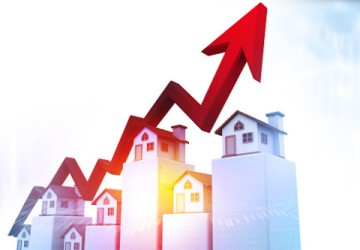In the free market, private or government-backed lenders compete for business, causing monthly mortgage rates to rise or fall.
Average interest rates on long-term mortgage payments remained historically low from 2013 to 2021 due to house price adjustments, tighter credit standards and a reduction in excess housing on the market, but began to rise in 2022, albeit still at historically low levels.
There is nothing to fear from rising lending rates, and understanding the issue will help reassure real estate market participants. Rising mortgage rates affect nearly every aspect of home buying; therefore, understanding the players in the real estate market is critical.

Rising property values and interest rates
Rising interest rates affect buyers and sellers. What-if scenarios suggest that home prices and home prices are closely related to mortgage rates, but the stability of the economy underpins both scenarios.
Higher mortgage rates have less of an impact on home values and home prices if the economy grows fast enough. A 1-percentage-point increase in mortgage rates would increase monthly payments by $238; nonetheless, a strong economy would allow the company's profit growth to more than offset higher rates.
Rising interest rates should not deter the housing market if the economy continues to boom and drive job and wage growth.
Interest Rates and Real Estate Investments
The impact of rising mortgage rates on real estate investment could be good. The rental market will expand as fewer people qualify for a mortgage. On the other hand, rising interest rates lower prices; therefore, it is sometimes wiser to buy when interest rates are rising.
Also, as interest rates have risen, lending standards have become stricter, leading to fewer real estate transactions. As a result, more people need to rent first before they can buy a house. A 1% rise in interest rates could translate into unexpected returns for investors suited to the domestic market.
Buy or sell?
Buying a property when interest rates are rising is not a big deal. Mortgage rates of 5% remain historically low. 30-year fixed-rate mortgages are still much cheaper today than they used to be, according to statistics from mortgage provider Freddie Mac.
The average annual interest rate on a 30-year fixed-rate mortgage has not exceeded 5% since 2009. When the Great Recession began in 2006, the average rate was 6.41%. Ten years ago, in 1996, the average mortgage rate was 7.81%. Ten years ago, in 1986, it was 10.19 percent.

What happens when interest rates rise?
When interest rates rise, mortgages become more expensive. This increases the cost of home purchases for customers. When real estate becomes more expensive, demand for real estate falls. Sellers then lower their property prices to attract buyers. The real estate market is affected by this.
Is there an advantage to mortgage companies having higher interest rates?
Higher interest rates favor companies that lend to homebuyers. Mortgage companies earn more when interest rates are higher. This increases the bank's revenue. Conversely, when interest rates are too high and demand for credit plummets, mortgage companies can suffer from a lack of business.




